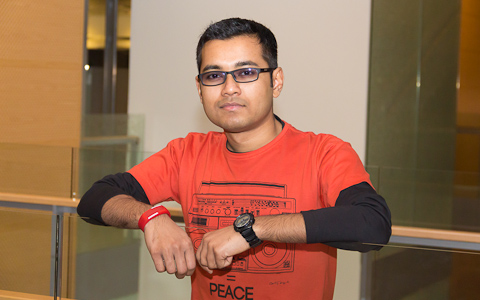Embedded Computing Master’s Degree Programme Combines the Expertise of Two Universities
Victor Kathan Sarker from Bangladesh found a degree programme that fit his interest from the University of Turku. After he completes his studies, besides his homeland, he wishes that he can benefit the Finnish society that provided the education.

Victor Kathan Sarker is a student in the University’s Embedded Computing Master's Degree Programme, where he is able to study his passion – electronics.
The students of the Embedded Computing Master's Degree Programme learn how to design smart embedded devices.
– The passion for electronics and technology has always been in me. Even before I went to school, I was excited about them. I would disassemble the toys my parents bought for me and tried to understand what was inside and how the parts worked, says Sarker.
The programme combines technical skills on several aspects, such as computer programming, hardware design and robotics, among other things. Moreover, the Programme is more versatile as some of the courses are organised together with Åbo Akademi University, the Swedish-language University in Turku.
– Obviously there are upsides to this arrangement. As a student, you get more variation because the two universities have a slightly different focus. When you have classes in both universities, you acquire comparative knowledge and can be more competitive.
The students of the Degree Programme come from different corners of the globe, from China to Sweden. In addition, the Programme is available for students with different educational backgrounds.
– I completed my Bachelor’s on Electronic and Telecommunications Engineering. Later, I felt that telecommunications is not my favourite path, but the education on electronics was obviously helpful. Here, I’ve met people from different backgrounds such as computer science, computer engineering and communications engineering.
Strong Expertise and Support Services Encourage Creativity
The Master's Degree Programme offers the students concrete tools for improving people's everyday lives. The studies aim at finding answers to the challenges that the use of technology imposes.
– In the programme, we learn about the workings of processors, peripherals and how appropriate hardware-software can be designed to make devices more energy efficient, among other things. One research focus is energy efficiency, as the need for energy increases each day with the growth of technology.
The University provides a creative learning environment that encourages students to realise their dreams and ideas. Sarker hopes that he can stay in Finland and create new technology so that he could thank society for the education it has given him.
– In Finland, engineering is a technologically advanced field and I want to contribute something to it in the future. There are many start-up groups that help resourceful students to start a business or create a service, Sarker assesses.
– I am interested in creating a service that would be developed by the students and for the students. May be the service could spark a fire in their minds and help them in becoming engineers.
The call for applications for Embedded Computing and other Master’s degree programmes is now open until the end of January or February. Read more about the international Master’s degree programmes in the University of Turku: http://www.utu.fi/en/studying/masters-degree-programmes/Pages/home.aspx
Ilkka Hemmilä
Translation: Mari Ratia